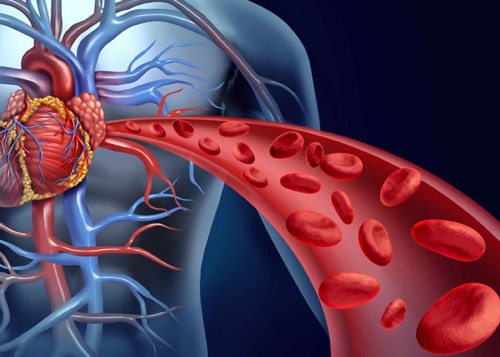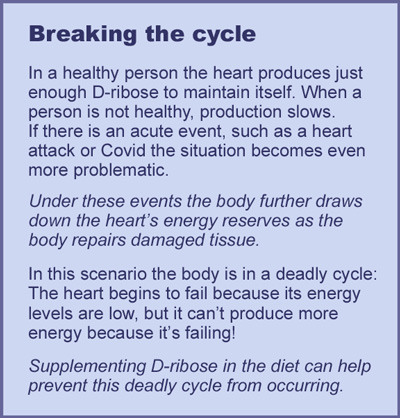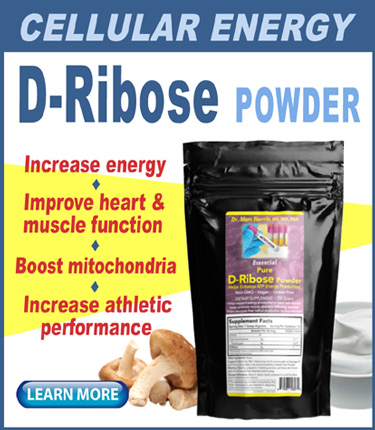Ribose is a sugar-like molecule that your body uses to make adenosine triphosphate, or ATP. ATP is the body’s most basic form of energy and the fuel burned by the cellular mitochondria—the powerhouse of the cell.
D-ribose is the type of ribose commonly found in nature and in the human body. There is also a synthetically-manufactured version known as L-ribose, which is not found in natural environments.
D-ribose is naturally created in the human body, and can be obtained from both animal and plant sources; however, since it is created in such small amounts, therapeutic levels can only be achieved with supplementing.
As D-ribose is so essential in the production of ATP, and since it actually helps provide cells with sufficient energy, many scientists feel the potential health benefits of utilizing D-ribose as a therapeutic is beyond estimation.
In the exercise community D-ribose supplementing has been popular for decades. It is known to increase endurance and energy, reduce muscle fatigue, and speed-up post-workout recovery. But even as athletes were capitalizing on the energy benefits, outside the limelight researchers have been slowly documenting other healing benefits of D-ribose.
Studies have so far demonstrated that the innocuous little “simple sugar molecule” is effective for combating heart disease, fibromyalgia, chronic fatigue syndrome, skin aging, and more.
In his book The Sinatra Solution: Metabolic Cardiology, Cardiologist Dr. Stephen Sinatra writes, “D-ribose may not be as well-known as its fellow ‘Awesome Foursome’ members—CoQ10, L-carnitine, and magnesium—it’s no less important for supporting and restoring energy production in the heart.”
Now, according to a 2021 review, these same benefits are potentially beneficial in the Covid-19 battle.
The root of the problem: Hyperviscosity
According to the authors of the review, the cardiac complications of Covid-19 “are most commonly caused by hyperviscosity, not viral invasion of endothelial cells or cardiomyocytes”—and D-ribose has already been used in treatment for hyperviscosity.
Hyperviscosity—also known as slow blood or thick blood—is not just caused by infectious diseases. It can also be caused by immunizations, or by steroids such as those used in hormone replacement therapy or prednisone-based drugs. It is common enough that Hyperviscosity syndrome is a well-known and oft-debated medical condition.
But, according to the review, hyperviscosity is especially dangerous for hospitalized Covid patients, and people suffering from the long-term effects known as Long Covid.
“This hyperviscosity is caused by high concentrations of acute phase reactants, especially fibrinogen, and immunoglobins. These increase erythrocyte aggregation which causes sludging of blood in areas of low shear in the coronary circulation, veins and microvasculature. This can lead to thrombosis,” the researchers wrote.
Based on earlier research, the authors of the review insist that overcoming the hyperviscosity issue lies in restoring metabolic substrates—and this is where D-ribose can perform its healing magic.
Metabolic substrates in the body’s tissues are used to produce energy (glucose, fatty acids, amino acids, and their byproducts) and to synthesize larger molecules (amino acids used for protein synthesis).
And, as the review makes clear, D-ribose is itself a metabolic substrate:
“All tissues are underperfused when blood viscosity is elevated. This reduces delivery of metabolic substrates needed to maintain cellular function. Post-covid syndrome may be the result of torpid recovery after prolonged hypoperfusion. D-ribose is a versatile metabolic substrate which may hasten improvement of post-inflammatory illness.”
Preexisting hyperviscosity increases severity
The severity of Covid-19 varies widely among patients, and the underlying health of the patient is a huge factor. According to the authors of the review, severe disease occurs especially in cases with preexisting hyperviscosity.
This is why Covid patients diagnosed with obesity, diabetes mellitus, hypertension, and heart failure are estimated to be responsible for 63.5% of the severe Covid cases. Since blood viscosity is almost always elevated in patients with these diseases, supplements such as D-ribose can offer help in all phases of Covid—before, during and after (i.e. Long Covid).
“Numerous studies have reported significant benefits with D-ribose in replenishing ATP levels and improving depressed myocardial function… Thus, D-ribose can fill multiple roles and may be a particularly useful building block in the recovery of cell function. Presently, D-ribose is commonly used by individuals as a nutraceutical; however, there are ongoing efforts to obtain Medical Food status and achieve approval for pharmaceutical applications,” the researchers wrote in the review’s conclusion.
The review, entitled The Detrimental Role of Elevated Blood Viscosity in Patients With COVID-19, was published in the Journal of Cardiology and Therapy in August 2021.
The review, a collaboration by researchers in the U.S.A. and The Netherlands, relied on heavy citation of previous research to draw their conclusions. In all 32 citations were used.
Related study
A later study coroborated hyperviscosity as a predictor of “higher risk of death” in hospitalized Covid patients.
The large-scale study, published in the Journal of the American College of Cardiology in July 2022, found “a simple calculation of blood viscosity” to be a robust methodology for “identifying patients at risk of dying from Covid-19.”
Find D-ribose in Essential D-Ribose from Optimal Health Systems. Click banner ad on this page to learn more.
– – –
Sources: Journal of Cardiology and Therapy, Journal of the American College of Cardiology.



